Thai Hung Pho restaurant is located in a small alley on Nguyen Huy Luong Street, Binh Thanh District, Ho Chi Minh City. The restaurant is small and the tables and chairs are also small, less than 10 tables. Customers also talk very quietly. Actually, it is okay not to talk. On the table there is a board, roughly: what customers eat, how much it costs, write it down on paper. The pieces of paper are the size of matchboxes, neatly arranged in the chopstick holder. It has to be written down because the waiter is deaf, and his hearing is not as clear as normal people.
"Poor people can't eat pho?"
Customers coming to the restaurant are gentle, quiet, and polite. Ms. Tra Dung said: The economy is difficult, so the number of people coming to the restaurant has decreased, sales are only half of what they used to be. Customers coming here can order pho at any price, the more money they have, the more meat they have. This has its history.
At that time, she had a relative in Cho Ray Hospital (HCMC). Next to her was a child taking care of her mother. Her mother was craving for pho, so the child took a plastic cup and ran away. A while later, she ran back, holding an empty cup. She cried. She asked why, and she said: "Pho is sold for 10,000 VND but I only have 5,000 VND". She thought hard: "Are poor people not allowed to eat pho?".
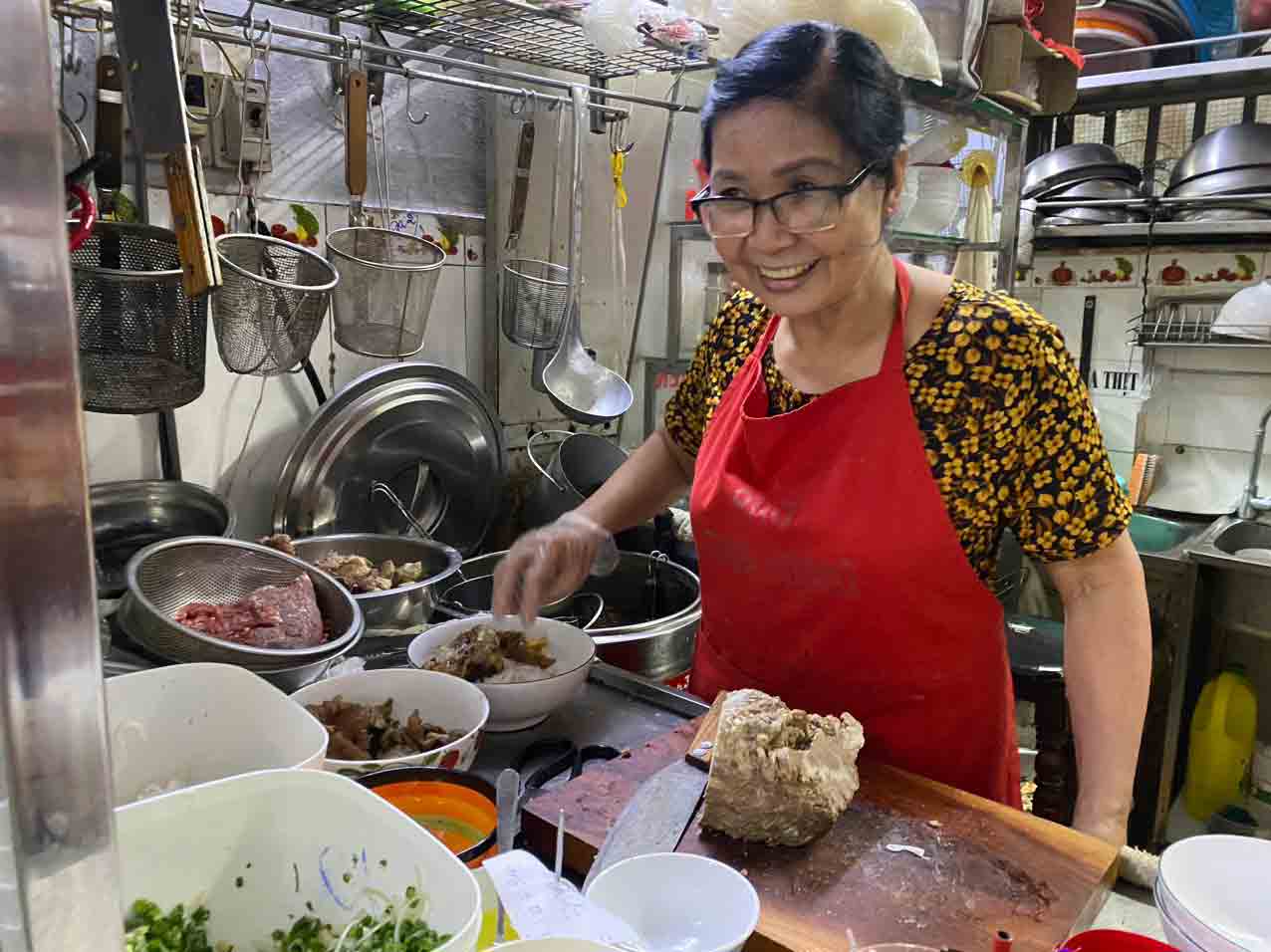
Ms. Mai Ha Tra Dung works in the kitchen at Thai Hung Pho restaurant, always with a bright smile and a love of life.
In 1995, the family encountered an incident and went bankrupt. Not sitting still and taking it, from a high-ranking employee of Hitachi, dressed in neat clothes, with a shuttle bus to work, she bought a big pot, saved 100,000 VND, bought stewed meat and bones, cooked porridge to sell in the neighborhood. Her husband was shocked, and his pride caused him to throw away all the pots and pans. She had to whisper to her husband, to put down her pride to feed her stomach.
But the pot of porridge helped the family get through the difficult times. Then she sold vermicelli soup with crab. Finally, she stopped with pho. Pho helped her regain what she had lost and build her career. Now every morning she stands in the kitchen, quickly making pho, her deaf niece Thi serves and her husband "obediently" arranges the carts for customers.
Pho Thai Hung is as delicious as any other pho. But it is more modern in that it has traditional pho, pho with green star anise, pho with silver star anise. There is also vegetarian pho for dieters - especially the sick. The broth is made from many kinds of fruits, including ginseng to nourish the weak.
Caring for the disabled
Thi, a waitress, has a very pitiful situation. Thi is from Tay Ninh. Her mother died of cancer when she was only 6 years old. Her drunkard father saw that she was mentally disabled due to cerebral palsy and abandoned her. Her second aunt took her in to raise her, but due to difficult circumstances and her absent-mindedness, she was not allowed to go to school, even a school for the disabled. She was locked up at home for 20 years, not allowed to have contact with the outside world.
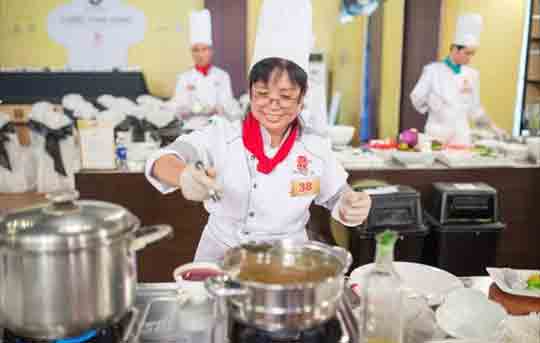
Ms. Tra Dung presents Pho at ASEAN Food Week 2018 in Malaysia
Ms. Tra Dung happened to know about the situation, brought the child to the shop, trained the child to interact with people and taught him how to work. "At first, he was as bewildered as a wild man. But now after 2 years, he knows how to do everything skillfully. He just has a hard of hearing and doesn't understand many long sentences," Ms. Tra Dung said.
Thi only understands simple words. When taught letters, she often forgets, only remembering words that are repeated every day enough to work. She doesn't know how to do math, and no matter how much she is taught, she still doesn't remember anything, and she doesn't know all the denominations of money. Therefore, Thi can't calculate money. That's why the restaurant invites customers to choose their own dishes and prices from the menu on the table. If they want to add anything, there is a price list for customers to pay themselves. "At first, many people were upset because they weren't used to it, but then everyone sympathized," Ms. Tra Dung shared. No wonder the morning I arrived, a customer passing by bought pho to take away, grumbling: "What kind of restaurant is this that makes customers write down the price of pho on paper, how strange...".
Thi is a girl who, at first glance, is clearly not normal, despite her bright face, slender body, cleanliness, and gentle features. "A person like that is working to support three other people, including an aunt who is now over 70 years old and is taking care of her elderly mother, and a 93-year-old grandmother who is senile. Seeing such a situation, can I ignore it?", Ms. Tra Dung confided.
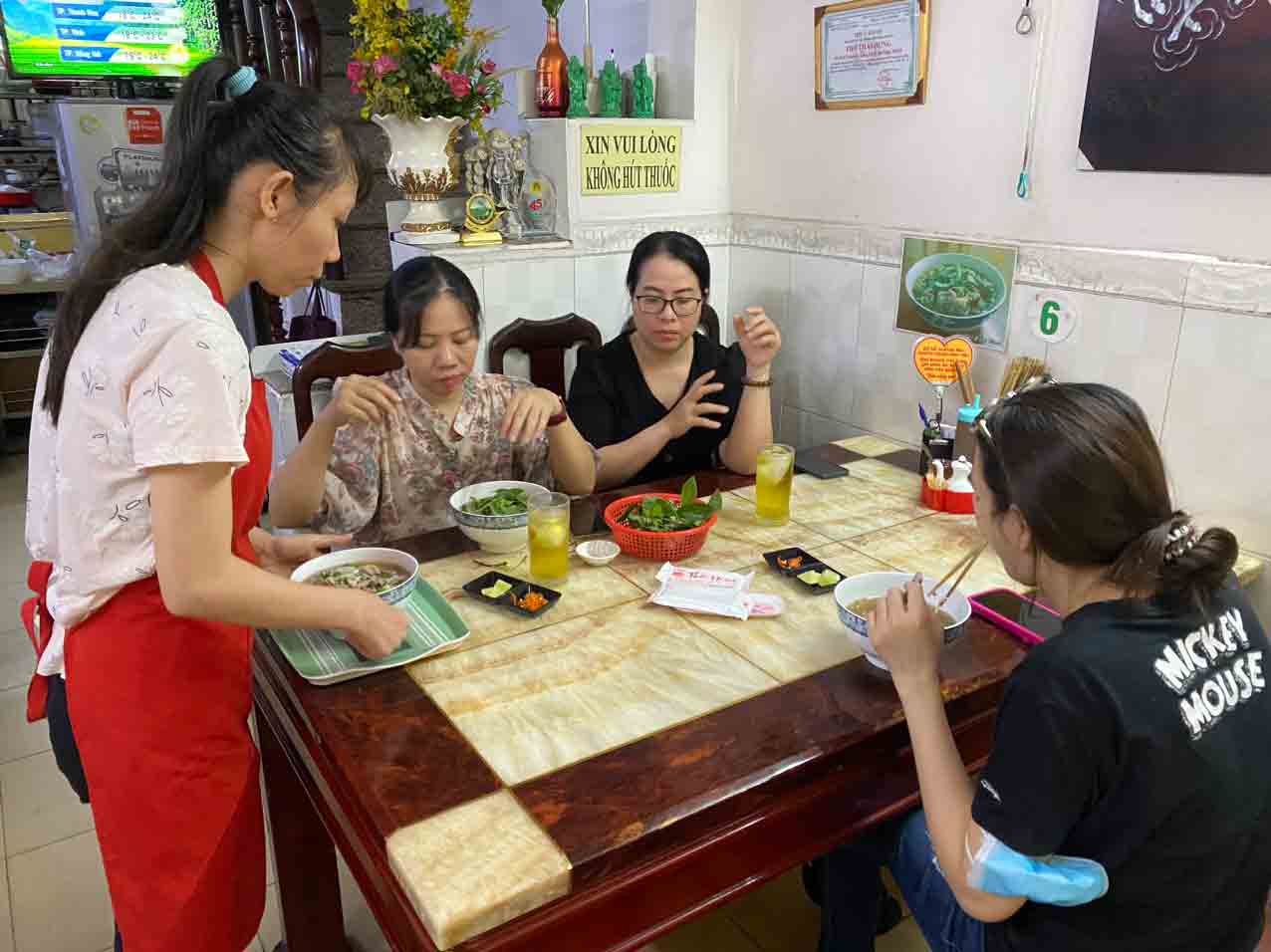
Baby Thi, a deaf employee who was taken in by Ms. Tra Dung, currently works at a pho restaurant.
Thi's aunt had previously taken care of her and her disabled husband, who passed away 2 years ago. When she was young, her aunt took care of her. Now that she is old, her niece, despite being deaf, can still provide her with meals of vegetables and porridge, thanks to the kindness of Ms. Tra Dung. In addition to her main job at the pho restaurant, she also supports teaching service skills to the children at the Ho Chi Minh City Center for the Disabled as well as supporting culinary training for new graduates who want to start a business.
"When teaching deaf children to work as waiters at the Center for the Disabled, I met many children in difficult circumstances. They really wanted to work, but few places would accept them. Therefore, I cherished the idea of opening a pho restaurant, a place for them to work, to spread the action of supporting disabled people to work in the community, support themselves and be respected," she expressed.
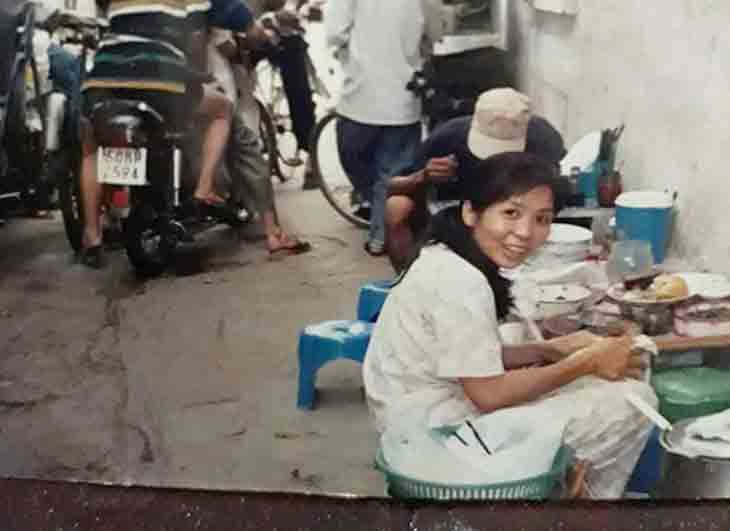
Ms. Tra Dung 29 years ago, when she sold a small pot of porridge at the alley entrance when she was down and out.
Five years ago, a Japanese organization learned about her model of creating jobs for deaf children at her pho restaurant and asked her to help organize this model. Now, she has helped complete the model and they invited her to Japan after Tet to test it, also to express their gratitude. She was very happy: "I know I did the right thing, doing something useful for society and for the children."
She said that many children confided that they felt very self-conscious and inferior when not only their friends and society but also their families sometimes looked down upon and rejected them. Therefore, when they got a job and received their first salary, some children hugged their sisters and cried... They knew that they could work to support themselves and not become a burden to anyone if they tried hard and had a good working environment.
Her dreams are still ahead. Right now, her biggest wish is to find a suitable location to open a shop and hire more deaf children. "But the price of the location is too expensive, I can't afford it. If I open a shop, I won't be able to support the children and I'll suffer. But I still want to, I won't give up," she said.
Bringing Vietnamese Pho to the world
Pho Thai Hung has been brought to the world by owner Mai Ha Tra Dung many times. Bringing it to the world is not to sell pho but to promote Vietnamese cuisine. In 2018, Pho Thai Hung was chosen by the General Department of Tourism as the dish to serve for "Vietnam Day" in Chiang Mai (Thailand).
Last year, she also brought her pho to attend "Vietnamese Pho Day" in Japan (organized by Tuoi Tre Newspaper) and left a deep impression on the Japanese people.
Source link








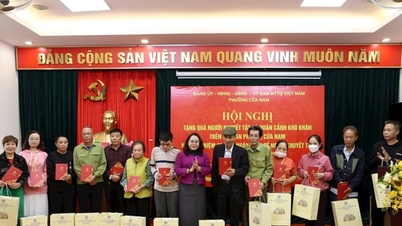



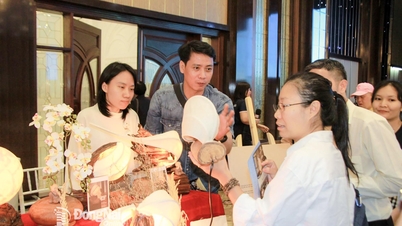

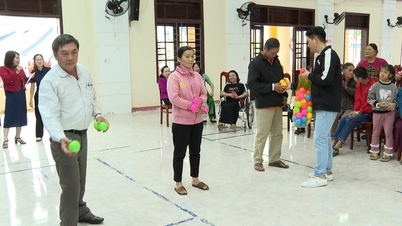

























![[Photo] Parade to celebrate the 50th anniversary of Laos' National Day](/_next/image?url=https%3A%2F%2Fvphoto.vietnam.vn%2Fthumb%2F1200x675%2Fvietnam%2Fresource%2FIMAGE%2F2025%2F12%2F02%2F1764691918289_ndo_br_0-jpg.webp&w=3840&q=75)
![[Photo] Worshiping the Tuyet Son statue - a nearly 400-year-old treasure at Keo Pagoda](/_next/image?url=https%3A%2F%2Fvphoto.vietnam.vn%2Fthumb%2F1200x675%2Fvietnam%2Fresource%2FIMAGE%2F2025%2F12%2F02%2F1764679323086_ndo_br_tempimageomw0hi-4884-jpg.webp&w=3840&q=75)
















































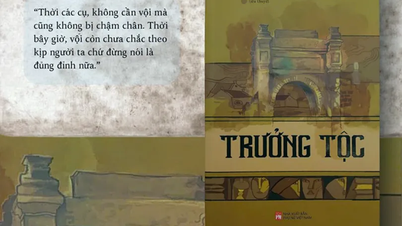


















Comment (0)